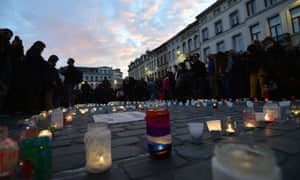
After the horrific events in Paris over the weekend Kate*, a primary school teacher in east London, faced a difficult discussion with her year 6 class. During their red-carpet session a child showed concern about the attack. Put on the spot, Kate used the opportunity to talk to her class.
“I asked the children who they thought Isis were and why they had attacked France,” she says. “Sadly some children said they acted in this way because they were Muslims; that Paris was ‘just the start’ and that Isis was planning to poison our food and water.”
Kate, who was not briefed by her manager on how to respond, explained that Isis does not reflect the whole Muslim community and that the children shouldn’t listen to wild rumours. She told them that while a terrorist strike wasn’t impossible in the UK, there are people working to protect them.
It’s vital that schools pick up on misinformation, according to Amy Cook, senior researcher specialising in safeguarding at The Key, a national information service for school managers. She says that teachers should ask children what they already know and listen for any worries that they have. “It’s also important to create a sense of proportion. Obviously, what’s happened is horrific but you don’t want to spread fear and anxiety.”
In his primary school in Streatham, south-west London, teacher Michael Holland discussed the events in Paris in a less explicit way. He didn’t talk directly about the gruesome side of what happened because the children hadn’t raised it.
Instead, they talked about the origins of children’s names and how many come from Christianity, Judaism and Islam. They then discussed what these religions all represent: love and peace. “We talked about the value of respecting other people and respecting where they are from. We had a really positive discussion,” he says.
Tom Welch, head of research at SSAT, a network of secondary schools in England, says it’s “a big loss” if schools – especially very diverse ones – avoid tackling such topics. “It’s a chance to go to the heart of character education,” he says. Schools often worry they will say the wrong thing or that students will express controversial ideas, Welch adds. But by opening up debate they can counter negative views and talk about such issues openly.
Peter Lee, vice principal at Q3 academy, a school in Birmingham that is “as diverse as you’ll find”, says that there’s no point in ignoring what’s happened. “In an age of 24/7 news coverage students will have questions,” he says.
As soon as news broke, Lee discussed how the school would respond with his senior leadership team. They decided to hold a minute’s silence during tutor time on Monday and made sure they focused on terrorism all over the world, not just on events in Paris. “Of course we show solidarity with France as our nearest neighbour in Europe,” says Lee. “But we also want to talk about what’s happening elsewhere.”
He adds: “We have a reflection period on Friday at 3pm and we’ve rewritten it, giving students the chance to ask questions about any concerns they have. It’s about dealing with this issue sensitively; we have a large mix of religions and races at the academy.”
Cook says honesty is important, particularly with older children. “With older children you want to challenge them to explore the issue themselves in a safe setting, posing questions. Ask them, why has this happened? How do you feel about it?”
But teachers must be prepared for some difficult comments. David*, a teacher in a secondary school in London, says that during a group discussion one student said that all Muslims were terrorists while a Muslim boy was present. “Our responsibility is to weed out skewed beliefs like this,” he says. However, David admits that it is difficult, because students often get information from home and through other channels.
David responded in class by exploring arguments against this view. He also asked the Muslim boy to write down how the experience had made him feel and how he felt the media portrayed his religion. David didn’t share this but it helped him gain an insight into the issues his student faces.
Out of class, David also had an individual conversation with the child who had made the inappropriate remark, explaining why he felt it was wrong. David says such ideas can’t be quashed overnight, and long-term conversations need to be had in school to build cultural bridges. The school now plans to introduce a series of assemblies to explain why certain views are offensive and racist. It will adopt a strict policy to make it clear that this sort of behaviour is not tolerated.
It’s these instant and often uninformed reactions that schools are well-placed to tackle. Dr Anthony VonBank, a US digital learning specialist, says: “I think it best for us to reassure students that it’s ok to be confused by these events and ok not to know how to feel about them.”
And as well as talking about what’s happened, schools themselves serve as great models for understanding global communities. “We stick together even though we are all different,” says VonBank. “This is a great way to help students from different backgrounds understand the immediate kinship of the classroom community, in the same way as global kinship is often felt after a tragedy.”
*Names have been changed in this article.

No comments:
Post a Comment